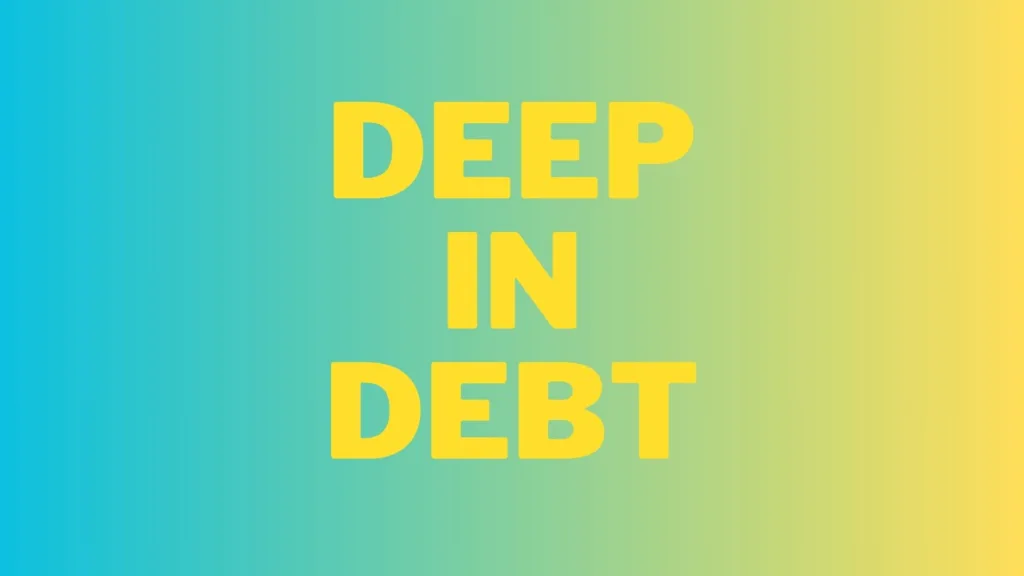Being in constant debt poses a multifaceted challenge that extends beyond financial strain, impacting emotional well-being, and future prospects. High-interest payments, reduced financial flexibility, and strained relationships characterize the financial aspect, while stress, anxiety, and depression mark the emotional toll. This might lead to long-term consequences including perpetuating a cycle of debt, limiting opportunities, and potentially facing legal repercussions. It is imperative that you keep track of your debt situation and you can use these five indicators to measure your level of debt.
High debt Balances
High credit card balances can be a significant indicator of financial strain and potential debt issues. When you consistently carry large balances on your credit cards, it often signifies that you’re relying on credit to cover expenses beyond your means. This includes having multiple mobile loans to cover your day-to-day expenses.
Issues with high debt and mobile loan balances
- Interest Accumulation: High balances accrue more interest, making it harder to pay off the debt.
- Credit Score Impact: Utilization ratio (the ratio of your credit card balances to credit limits) heavily influences your credit score. High balances can lower your score.
- Debt Spiral: Failure to pay down balances can lead to a cycle of debt, where minimum payments barely cover interest charges.
How to Take Care of High credit and mobile loan balances
- Budgeting: Create a budget to allocate funds towards paying off credit card debt.
- Debt Snowball or Avalanche: Use either method to systematically pay off debts.
- Negotiate Lower Interest Rates: Contact creditors to see if they can lower your interest rates, making it easier to pay off the balance.
Late or Missed debt Payment
Consistently missing due dates or making late payments on bills, loans, or credit cards is a red flag for financial instability and potential debt problems. It indicates a lack of organization or insufficient funds to meet financial obligations.
Issues with Late payments
- Fees and Penalties: Late payments often incur fees and penalties, increasing the debt burden.
- Credit Score Impact: Payment history is a significant factor in credit scoring. Late payments can severely damage your credit score.
- Creditor Relations: Repeated late payments can strain relationships with creditors, potentially leading to collection actions.
How to Take Care of Late Payments
- Set up Automatic Payments: Schedule automatic payments for bills to ensure they’re paid on time.
- Calendar Reminders: Set reminders for due dates to avoid missing payments.
- Negotiate Payment Plans: If you’re unable to make payments on time, contact creditors to negotiate payment plans or alternative arrangements.
Relying on debt for Basic Expenses
Using loans or credit cards to cover everyday expenses like groceries, utilities, or rent suggests that your income isn’t sufficient to meet your basic needs, leading to a reliance on borrowed funds.
Issues with Relying on loans for basic expenses
- Debt Accumulation: Continuously relying on credit for basic expenses can lead to increasing debt levels.
- Financial Instability: Depending on loans or credit cards for essentials indicates a lack of financial stability.
- Interest Costs: Borrowing for everyday expenses incurs interest costs, further straining finances.
How to Take Care of Basic Needs Without Loans
- Budget Adjustment: Reevaluate your budget to prioritize essential expenses and cut discretionary spending.
- Increase Income: Explore opportunities to increase your income through additional work or side hustles.
- Seek Financial Assistance: Consider seeking financial assistance from government programs, charities, or community organizations.
Constantly Borrowing Money
Frequent borrowing from friends, family, or payday lenders to cover expenses suggests ongoing financial difficulties and potential debt issues. It’s a sign that your income isn’t sufficient to meet your financial obligations.
Issues with constantly borrowing Money
- Dependency: Constant borrowing indicates a dependency on external sources for financial support.
- Strained Relationships: Borrowing money frequently can strain relationships with friends and family.
- High Costs: Payday loans or other forms of borrowing often come with high interest rates, increasing the overall debt burden.
How to stop constant borrowing
- Create a Repayment Plan: Develop a plan to repay borrowed funds, prioritizing high-interest debts first.
- Financial Counseling: Seek guidance from a financial counsellor to address underlying financial issues and develop strategies for managing money effectively.
- Emergency Fund: Build an emergency fund to cover unexpected expenses and reduce the need for borrowing in the future.
Stress and Anxiety About Finances
Persistent worry, stress, or anxiety about finances is a common emotional response to being deep in debt. It can negatively impact mental health and overall well-being.
issues with constant anxiety about finances
- Mental Health: Stress and anxiety about finances can lead to depression, anxiety disorders, and other mental health issues.
- Impact on Relationships: Financial stress can strain relationships with family, friends, and colleagues.
- Decreased Productivity: Constant worry about finances can reduce productivity and impair decision-making abilities.
How to Take Care of finance induced anxiety
- Seek Support: Reach out to friends, family, or mental health professionals for emotional support.
- Financial Education: Educate yourself about personal finance to better understand your situation and develop strategies for improvement.
- Mindfulness and Relaxation Techniques: Practice mindfulness, meditation, or relaxation techniques to manage stress and anxiety effectively.
